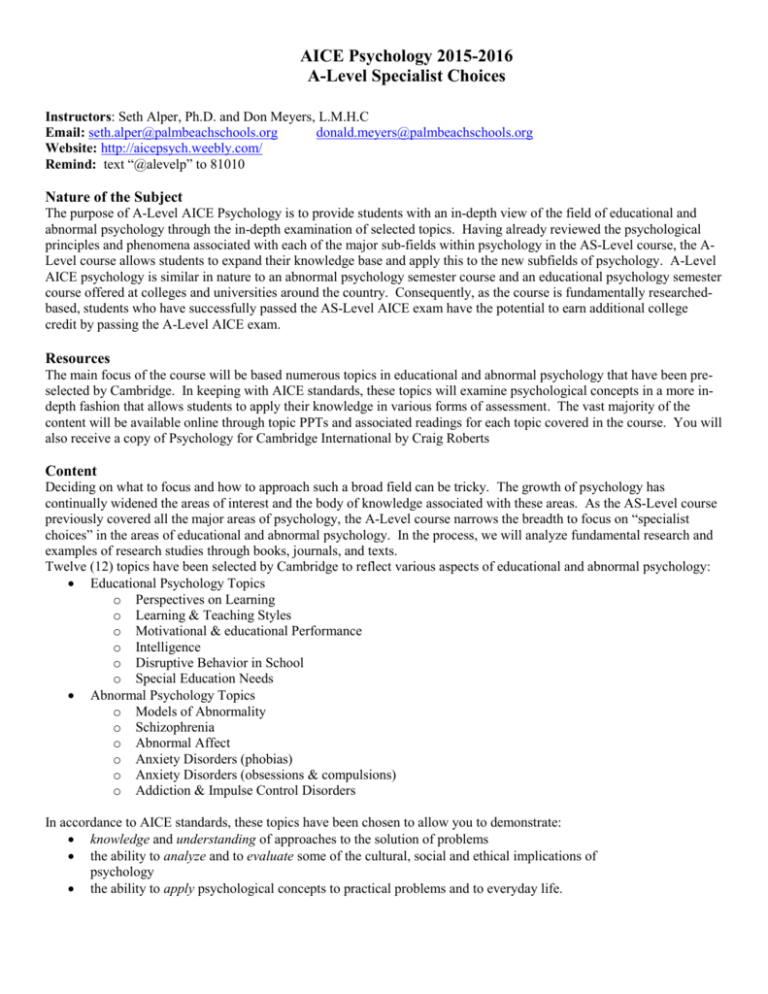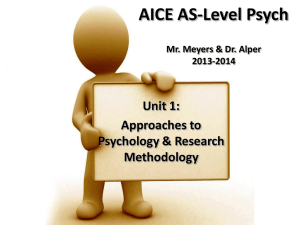File - AICE Psychology
advertisement

AICE Psychology 2015-2016 A-Level Specialist Choices Instructors: Seth Alper, Ph.D. and Don Meyers, L.M.H.C Email: seth.alper@palmbeachschools.org donald.meyers@palmbeachschools.org Website: http://aicepsych.weebly.com/ Remind: text “@alevelp” to 81010 Nature of the Subject The purpose of A-Level AICE Psychology is to provide students with an in-depth view of the field of educational and abnormal psychology through the in-depth examination of selected topics. Having already reviewed the psychological principles and phenomena associated with each of the major sub-fields within psychology in the AS-Level course, the ALevel course allows students to expand their knowledge base and apply this to the new subfields of psychology. A-Level AICE psychology is similar in nature to an abnormal psychology semester course and an educational psychology semester course offered at colleges and universities around the country. Consequently, as the course is fundamentally researchedbased, students who have successfully passed the AS-Level AICE exam have the potential to earn additional college credit by passing the A-Level AICE exam. Resources The main focus of the course will be based numerous topics in educational and abnormal psychology that have been preselected by Cambridge. In keeping with AICE standards, these topics will examine psychological concepts in a more indepth fashion that allows students to apply their knowledge in various forms of assessment. The vast majority of the content will be available online through topic PPTs and associated readings for each topic covered in the course. You will also receive a copy of Psychology for Cambridge International by Craig Roberts Content Deciding on what to focus and how to approach such a broad field can be tricky. The growth of psychology has continually widened the areas of interest and the body of knowledge associated with these areas. As the AS-Level course previously covered all the major areas of psychology, the A-Level course narrows the breadth to focus on “specialist choices” in the areas of educational and abnormal psychology. In the process, we will analyze fundamental research and examples of research studies through books, journals, and texts. Twelve (12) topics have been selected by Cambridge to reflect various aspects of educational and abnormal psychology: Educational Psychology Topics o Perspectives on Learning o Learning & Teaching Styles o Motivational & educational Performance o Intelligence o Disruptive Behavior in School o Special Education Needs Abnormal Psychology Topics o Models of Abnormality o Schizophrenia o Abnormal Affect o Anxiety Disorders (phobias) o Anxiety Disorders (obsessions & compulsions) o Addiction & Impulse Control Disorders In accordance to AICE standards, these topics have been chosen to allow you to demonstrate: knowledge and understanding of approaches to the solution of problems the ability to analyze and to evaluate some of the cultural, social and ethical implications of psychology the ability to apply psychological concepts to practical problems and to everyday life. Required Readings and Online Content As with any advanced course, not all material will be covered in class. For each topic, students will be required to view online content, including (but not limited to) PPTs, online lectures, videos, and similar resources. Thus, it is the student’s responsibility to keep up with all assigned reading. It is imperative that student read and view this content (both printed and electronic) and keep them organized in a course-specific binder. Suggested Student Materials Course-specific 3-ring binder (1-2”) and accompanying dividers 3-4 packs of 3×5 note cards- these will be utilized for key vocabulary terms and review material Blue pens and several different colors of highlighters – these will be needed in order to complete required markups of the studies and supplemental resources Several packs of sticky notes to be used for reviewing the studies Coursework & Homework Will consist of readings, notes, papers, activities, and various ‘projects’ Evaluation Students will be evaluated using a ‘total points’ system in which the grade will be derived from the points earned by the student divided by the total points possible for the marking period. All tests will be in the short answer/essay format whereas quizzes may be in short answer and/or multiple-choice format. Class participation will also be factored into the final grade. AICE style assessments will be worth approximately 70% of the class grade while class work, homework, class participation, papers, activities, and projects will make up the remainder. Makeup work will be arranged between the teachers and the student based upon district guidelines (see below). Grading Scale For the ‘AICE-style’ assessments, grades will be based upon the AICE scoring rubric provided by Cambridge All other assignments and the course grade will be based upon the District standards o A 89.5–100 B 79.5–89 C 69.5–79 D 59.5–69 F below 59.5 Class Rules Be prompt and be prepared- come to class prepared to learn by having all necessary materials with you and any readings accomplished beforehand. Be respectful to others, the classroom, and to yourself. All school rules apply- the Bronco Trail of Excellence will guide all disciplinary action. Attendance and Make-up Work This class moves very quickly. It is therefore very important that you attend school regularly. You are responsible for seeing your teachers about missed work. Absences do not excuse missing your notes. You will be given a syllabus to follow and a daily calendar will be posted online. You are expected to keep up if you are in class or not. For excused absences, you will have the same amount of time to make-up any missed assignments (such as 2 excused absences = 2 days to make up the work). If you miss a test/quiz day, be prepared to take the test/quiz on the day you return. If you miss a review for an announced test, you will still be required to take the test on the announced date. Instructors reserve the right to provide an alternative test/quiz for each class hour and for students who are absent on the day of the original test/quiz. If you need to miss class for a school sponsored activity or for another class (for instance to make up an exam) this must be done IN ADVANCE. We will not excuse you without prior consent. Violation of the Palm Beach Central Honor Code will not be tolerated in any way, shape, or form. Consequences for academic dishonesty are an automatic zero, parental notification, and the notification of the sponsor of any club you belong to or any coach that you might have. Do not cheat. Do not “work together” unless directed to do so. Course Donations If possible, donations of the following are appreciated: tissues, printer paper (white and colored), paper towels, binder clips (various sizes), hand sanitizer, and/or all-purpose cleaning solutions (such as Clorox wipes & Formula 409). The AICE A-Level Psychology Exam- Specialist Choices At the end of the course there will be one paper administered by CIE. The paper is weighted as such: skills of knowledge and understanding are 50%, and skills of analysis, evaluation, and application are 50%. Remember that the grade for Paper 3 is also calculated by the grades that you have received on Paper 1 and Paper 2 for the AS-Level. For the A-Level Exam: The paper will consist of short-answer and structured essay questions and will be assessed by a 3 hour examination. The questions for each specialist choice option are divided into three sections: Section A: Compulsory short-answer questions on a particular topic area [6 marks] Section B: 1 compulsory structured essay [20 marks] Section C: 1 structured question on applying psychology, from a choice of two. [14 marks] This course will highlight the following student skills for success in the course: 1. Demonstrating knowledge: describing the details of a study and the results. 2. Understanding: inferring the meaning of results. 3. Analysis: The ability to express information and ideas clearly, identify key points in one study and see relationships to others, making valid generalizations. 4. Evaluation: The ability to point out errors and consider the effect on the data, consider the quality of the data, procedures and outcomes 5. Application: using the knowledge in a different scenario. The ability to consider a new finding and apply it to existing theory. This course will highlight the following themes: 1. Methodology: evaluate the psychology for the methods that are used. 2. Approaches and Perspectives: How does psychology inform our view about the human experiences and action? 3. Issues and Debates: consider alternative points of view and debate explanations of human experience and action, particularly the impact of psychology on everyday life. Additionally, as the full Cambridge syllabus denotes, in contrast to the first part of the course, which requires an in-depth look at core studies, this part of the course requires much less depth, but much more breadth. Rather than considering every aspect as for a core study, here candidates need only consider the essential elements of a study, for example the abstract of a study. More importantly, it is what a study illustrates that is important. For example, if the topic area is health psychology and the specific sub-section is the measurement of pain, and one specific aspect is the UAB pain observation scale, only a little knowledge of this is needed. It is more important to know: how this measure differs from other measures; that it is the observation method; that it gathers quantitative data; that the method is ethical and ecologically valid; and any other aspect of approaches, methods, issues and debates that are applicable. To consider the original published article for each sub-section of the two chosen options would be impossible. A much better approach is to consider textbooks which provide a brief summary of the study. Underlying each option are the themes of the AS Level component of the course. These are the approaches, perspectives, methods and the issues and debates. Candidates should bring forward from the AS Level what they have learned about these themes and consider how they apply to the new subject matter of the specialist choice options



